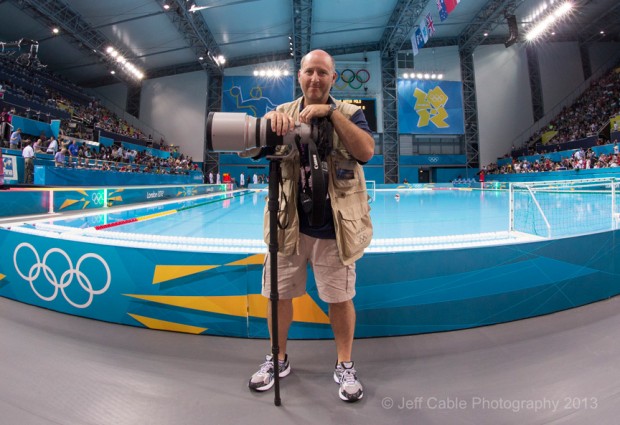
Shooting the Olympic Games: The preparation, challenges, and the advantages!
Hundreds of millions of people have watched the Olympic Games on their televisions or seen the countless images being transmitted online from this epic sporting event, but far fewer have had the opportunity to experience the Olympics first hand. Trust me, being there is truly an amazing experience!
I have been lucky enough to photograph three Olympic Games (Beijing, Vancouver, and London) and I am already preparing for the 2014 Winter Olympics in Sochi, Russia.
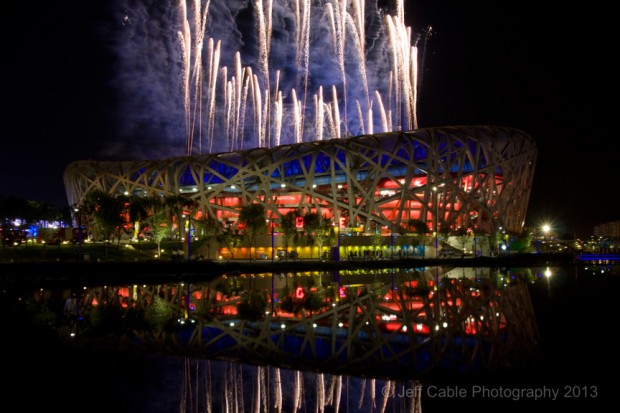
Since you are reading this on Scott's blog, chances are you have an interest in photography, and maybe even sports photography. I thought you might like to know what it is like to be a photographer at the Olympics.
Photographer Dave Black says that "shooting the Olympics is like photographing three Super Bowls per day for 16 consecutive days." And he is right. At the Olympics, the pressure is huge and the competition is fierceâ”and I am just talking about the photographers!
But let's back up for a second and talk about the planning, since well before shooting the Olympics, there is a ton of preparation involved.
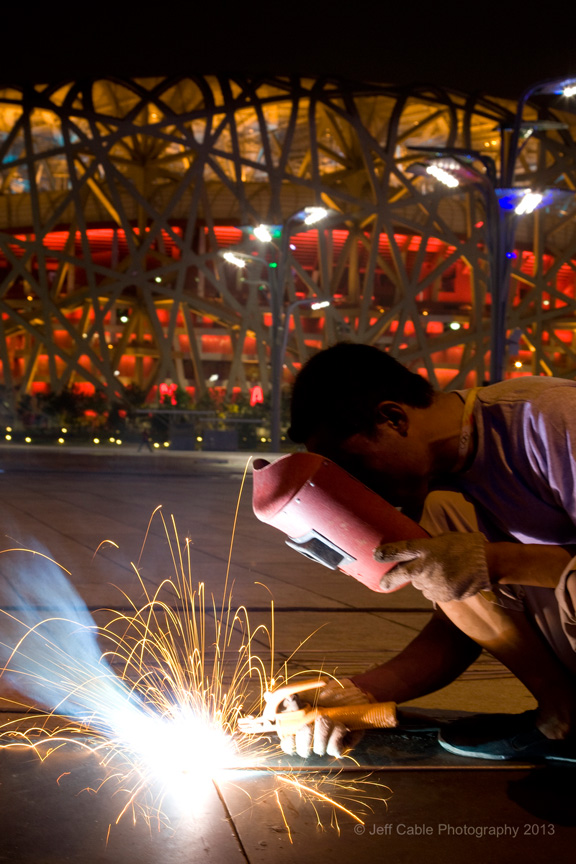
The Preparation
The first and most important part is getting the ever-coveted Olympic photographer credentials. Since most countries only get a handful of these, this is rarely ever a "given" and must be earned. It took me years of work and building relationships to get my first chance. Now that I have photographed numerous Games and proven myself, this process is a little easier than trying to break into this from square one, but still never a "given."
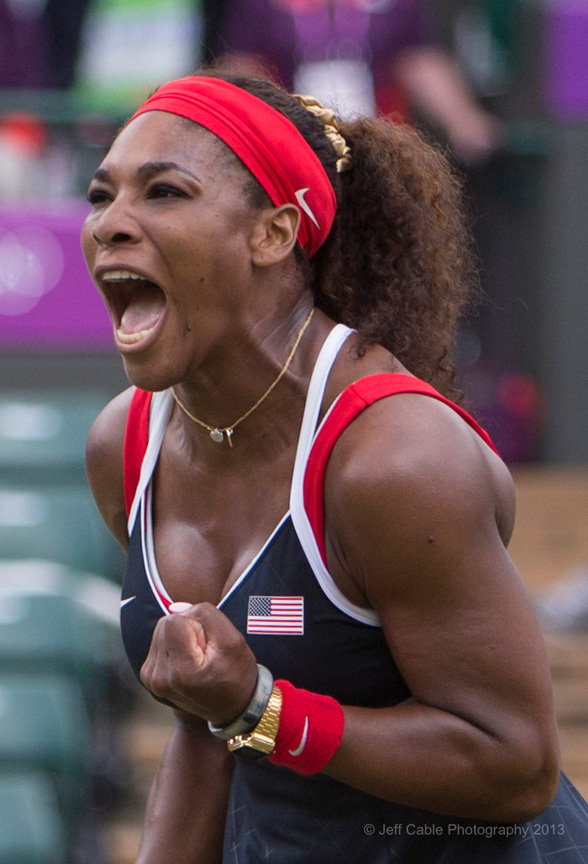
Then, assuming that I get my credentials, there is the challenge of travel and lodging. I need to find airlines that make it easy for me to carry on lots of gear, since I have no desire to check my expensive camera gear. Before my first Olympics, I lost weeks of sleep just trying to figure out what gear to bring with me. How many cameras? Which lenses? How many memory cards? How many bags?
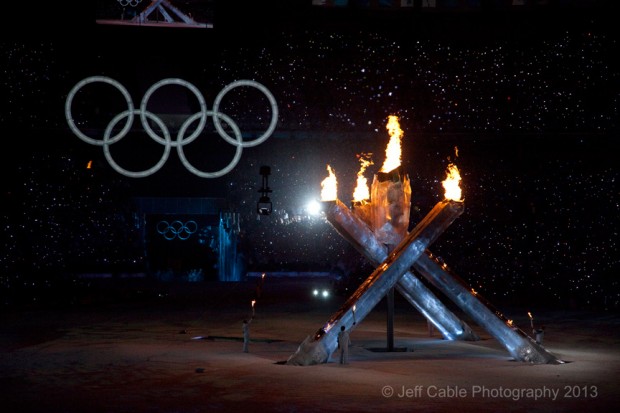
And, this is the Olympics, which means that hotel rooms are hard to find and expensive. It's imperative to find a place to stay that is close enough to the Olympic Park, with easy access to the press buses, but not crazy expensive. Access to the press buses is key, since this helps me avoid crowded public transportation. Did you know that they have special "Olympic lanes" on the roads? The press buses are allowed to use the special lanes en route to the park, which saves more time, and time is at a premium.
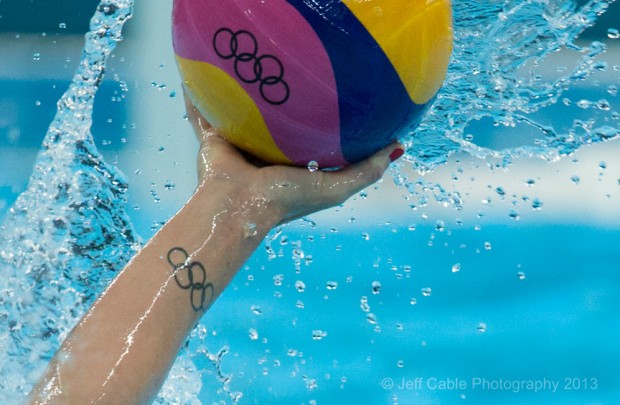
Before leaving for the Games, I need to be "in the know." I need to know everything I can about the sports I'll be photographing. Having an intimate knowledge of the sport helps me predict the key moments and best shooting locations. I also need to know about the venues. In London I spent a lot of time at the Water Polo venue, so I arrived there four days before the competition started and walked every inch of the building. I learned the allowable shooting positions, the restrictions, possible remote locations, pressroom details, and much more. And, of course, I need to know my camera inside and out. At the most recent 2012 Summer Olympics in London, I was using the newly released Canon 1DX. I was lucky enough to get my hands on a prototype of the camera a month before I left for London, so that I could become familiar with the new user interface and button layout.
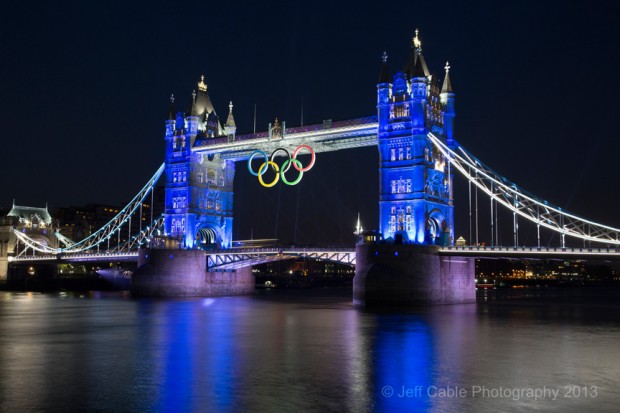
The Challenges
Before shooting my first Olympics, I looked at the schedule and mapped out a plan of events to shoot. It was not until I got to the visiting city that I realized that the distance between venues and extended travel time meant that I could only shoot two or three sports per day. Not only are the events in many different locations, but their times often overlap, as well. There were many times in Vancouver when I could not photograph both USA Hockey teams (men and women) because their games overlapped and the arenas were an hour apart. I found a new tool while in London that was a real game-changer for me. For the first time ever, there was an iPhone app for the Olympics, which listed out the events for the day. If my schedule changed for any reason, I could look at the app, see what other events might be upcoming, and change my plan right there and then. It was awesome!
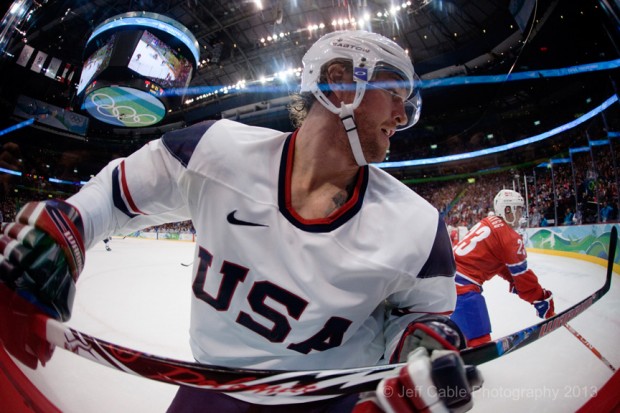
It's also very important to get into a shooting position early. It's not possible to show up last minute to the swimming pool to shoot a medal event. There will likely be hundreds of other photographers there, taking the best spots. It also helps to understand how many others will be shooting with you. The Summer Olympics, for example, might have 2,000 photographers onsite, while the Winter Olympics averages only 800 of us shooters.
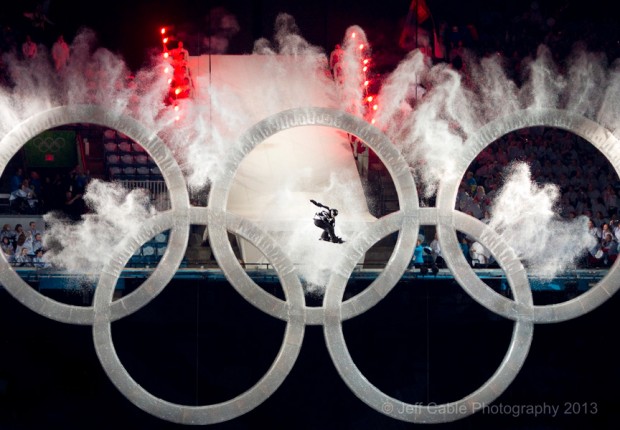
Oh, and this is the Olympics. You can't just shoot from anywhere. Most of the time, shooting locations are limited and mapped out by the International Olympic Committee (IOC). This makes it even harder to find a unique shot. Often times, I will walk into the spectator area to try to find a unique perspective, but when shooting up-close to the action, you are generally lumped in with all the other shooters. Each venue will have their own restrictions, so before shooting there for the first time, I stop by the venue press office and ask about their setup. They let me know when I can enter the playing area, where we can stand, if remote cameras are allowed, etc. If I have never photographed that particular sport, I might even ask advice for optimum lens choice. Some events, like the Opening and Closing Ceremonies and certain gold medal matches, are what they call "high impact events" and those require tickets, even for us photographers. For those tickets, you must apply to your National Olympic Committee (NOC, or in my case the USOC). Believe it or not, there are many photographers who go to the Olympics who can't get tickets to the Opening Ceremonies.
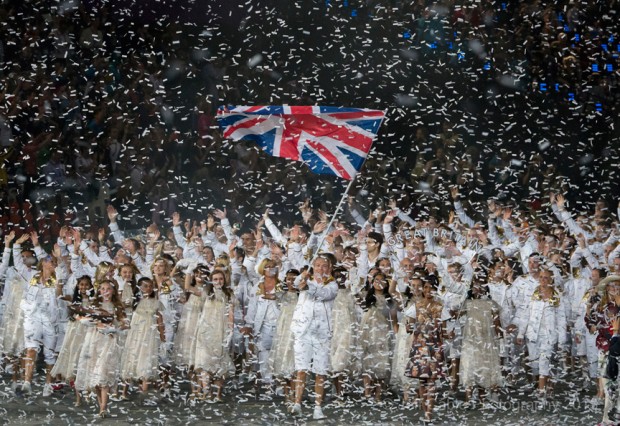
I mentioned that time is at a premium at the Olympics. This is really an understatement. The typical hours of an Olympic photographer are 9 a.m. until 2 a.m. every day. This is the one time in my life where I eat to survive, not to enjoy the food. For me, just about every waking moment is taken up by prepping, shooting, downloading, moving from one location to another, editing, posting, and blogging. I was under contractual obligations to go through my images from each game and get them back to Team USA within two hours of the completion of that event. That means that I am going through thousands of photos, finding the best 10 or 15 shots, adjusting them (exposure, white balance, croppingâ”no cloning is allowed), and then sending them through ftp back to the U.S. Most nights in London, I was eating a quick dinner at midnight while posting a blog or the last images from that day.
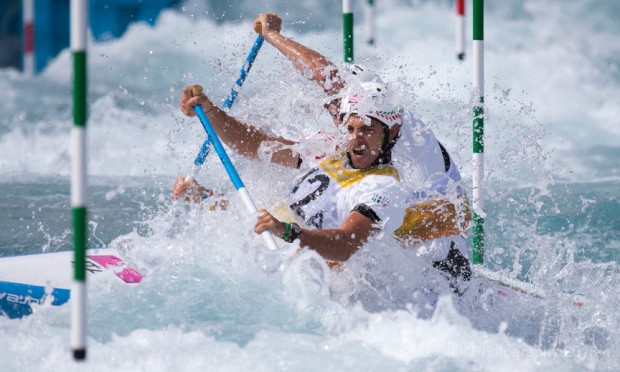
The key to shooting the Olympics, like so many other photography assignments, is to tell a story. For this reason, I'm always acutely aware of what is happening in front of me as I capture my images. Who is the star? Who just made a game-changing mistake? Who is the most interesting person to the audience back home?

The Advantages
Along with all of the challenges of shooting the Olympics, come the big advantages of being there. First of all, I am at the Olympics! Even though I have photographed three of these events already, I still get chills thinking about the next one. There is a very special vibe at the Games, with most people very excited to be there, and lots of geographic pride. This leads me to the next advantage: I get to represent my country. Not as an athlete, but as a professional who is there to do my job and do it as well as possible. Heck, I'm competing to get that "gold medal shot" that nobody else captured.
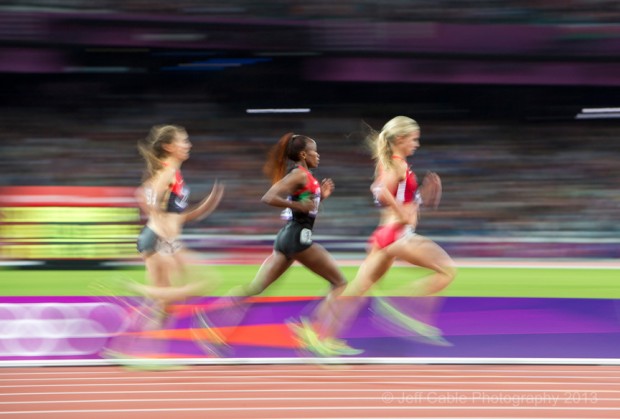
As a fully accredited photographer at the Olympics, I have the best seats in the house and often times get a chance to mingle with the athletes. And every shot that I take is another piece of history being captured.
While one of the biggest challenges is dealing with hundreds or thousands of photographers vying for the killer shot, it's also one of the best advantages of being at the Olympics. I get a chance to meet amazing photographers from all over the world, and see them again at the next Games. Spending time together in this pressure-cooker environment makes you a close-knit family in a short amount of time.
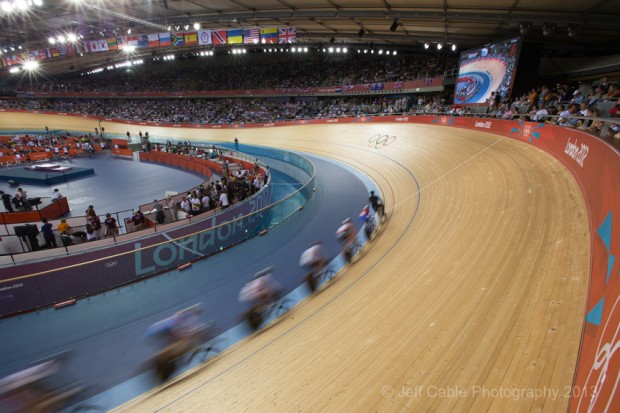
Another great advantage of shooting the Olympics is that I get a chance to photograph unique and varied sports. Trust me, there isn't a whole lot of bobsledding action in the San Francisco area! I love the challenge of shooting something different, and often find that my favorite images from the Games are from sports that were new for me.
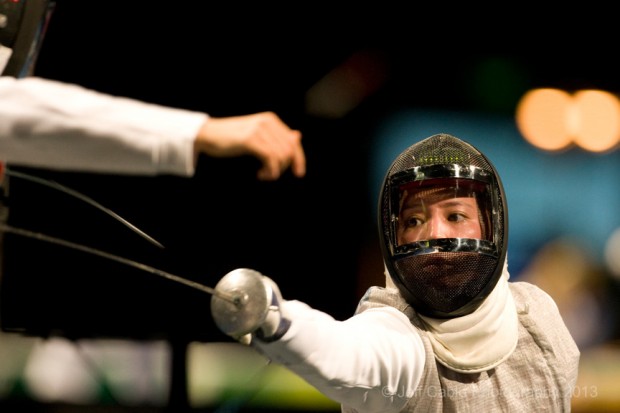
Shooting the Olympics does provide one large business advantage for me. It helps me to build my reputation within the photo community. And I won't lie; having the Olympic credentials definitely impresses potential clients. In this competitive environment, if this helps me differentiate myself from the other photographers in my area, that's a good thing.
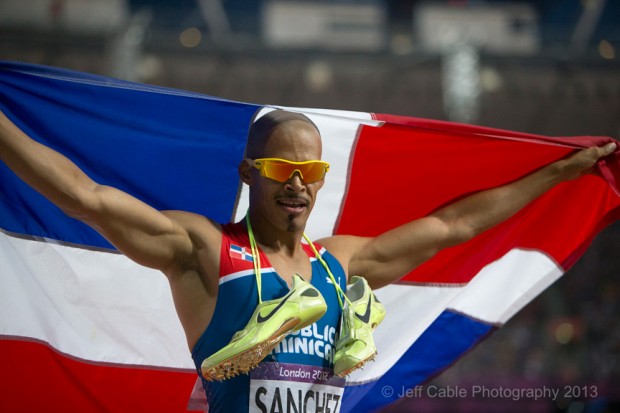
Lastly, and most importantly, shooting the Olympics is fun! Sure, it is a ton of pressure, endless work, and crazy long hours, but it is a blast nonetheless.
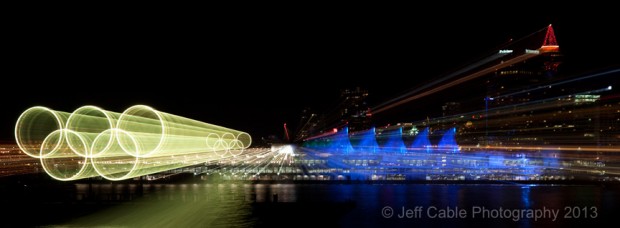
You can see more of Jeff’s work at JeffCable.com, keep up with him on his blog, and like him on Facebook.

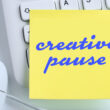
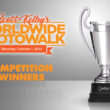
Great post and nice insight!
I do have one question: How does team USA makes sure it covers all events when you are allowed to pick your own events to shoot?
Ron – I am contractually obligated to shoot certain events for the team and then, when I have free time, can go wherever I want. Team USA can purchase other images from the photo agencies.
Great stuff Jeff. Thanks for sharing your photos and experience. I’m not a big sports fan but I love the Olympics because there are so many passionate people involved with it. I can’t quite put my finger on it but I’m really drawn to the photo of the fencer. Maybe it’s the emotionless focus on just executing? Anyway, thanks!
Awesome Shots!!!! (really like the last one of Sanchez, since I’m Dominican LOL) It’s good to get a behind the scene look at what a photographer has to go through to shoot at the Olympics. I’ve often wondered what it’s like to be there. Thank you for sharing.
Great post and I also enjoyed reading your blog as the games were going on. I could live my dream of going there through your experience.
This is so interesting to get a behind-the-scenes look of an Olympic photographer. I love the Olympics so this is just fascinating I am envious of your adventure and talent and could have read more. Thanks again for sharing. Your photos are beautiful and creative and they show your ability to capture the feeling of the moment.
Great Post. You were shooting for TeamUSA, how many others photographers were also shooting for them. We you assigned what sports to shoot?
Can you give us some idea of how you get compensated for you work, is a flat fee per contract or by per photo
Great BTS Jeff. I followed you all through the Olympics and it was really cool to read your posts nearly every day of the Olympics, especially seeing how much you were working, it really made the London games that much more exciting to watch, so thanks for taking the time to blog!
While I enjoyed the post and the excellent composition of the photos, they all appeared to be a bit “soft” to me (vs. the tack-sharp photos that Scott usually posts of his NFL shots, etc.) Why is that? (No disrespect intended at all….I truly would like to know.) Artist preference? Or is it because you cannot alter the photo in any way? (If so, and are shooting jpegs, wouldn’t you be allowed to set the sharpness settings for jpegs in the camera itself to whatever you like?) Is it something else? Thanks.
While I enjoyed the post and the excellent composition of the photos, they all appeared to be a bit “soft” to me (vs. the tack-sharp photos that Scott usually posts of his NFL shots, etc.) Why is that? (No disrespect intended at all….I truly would like to know.) Artist preference? Or is it because you cannot alter the photo in any way? (If so, and are shooting jpegs, wouldn’t you be allowed to set the sharpness settings for jpegs in the camera itself to whatever you like?) Is it something else? Thanks.
Hi Jeff,
I’ve recently watched some of your videos on Youtube. Would like to see you do some class of event shooting on Kelbytraining.